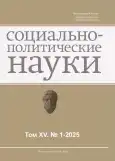Особенности реализации молодежной политики в России на современном этапе
- Авторы: Седых Н.Н.1
-
Учреждения:
- Финансовый университет при Правительстве Российской Федерации
- Выпуск: Том 15, № 1 (2025)
- Страницы: 37-42
- Раздел: Политические институты, процессы и технологии
- URL: https://bakhtiniada.ru/2223-0092/article/view/313352
- DOI: https://doi.org/10.33693/2223-0092-2025-15-1-37-42
- EDN: https://elibrary.ru/IOCVIE
- ID: 313352
Цитировать
Аннотация
Цель статьи заключается в исследовании основных параметров и проблем организации и реализации молодежной политики в России на современном этапе. В результате изучения работ отечественных и зарубежных ученых, а также анализа статистических данных за последний годы, были сделаны следующие выводы. В основе современной молодежной политики находятся вопросы самореализация молодых людей и развитие их ценностных ориентиров. Проблема самореализации, связанная с жизненными целями, социальными ролями, профессиональным самоопределением, является наиболее актуальной в данном возрастном периоде. При этом, анализ статистических исследований за последние годы показывает высокий процент не работающей и не обучающейся молодежи. Установлено, что среди причин низкой социальной и экономической активности молодые люди указывают отсутствие вакансий, низкий уровень заработной планы, несоответствие требованиям работодателя, плохие условия труда и т.д. Довольно высокий процент респондентов указывал на нежелание искать работу и заниматься профессиональной деятельностью вообще. Определена необходимость формирования эффективной экосистемы молодежной политики, которая будет способствовать максимальному раскрытию потенциала молодежи. Предложены мероприятия, направленные на повышение экономической и социальной активности молодежи: программы поддержки молодежных инициатив карьерного роста на муниципальном уровне, усиление взаимодействия образовательных организаций и предприятий с целью развития профессиональных навыков будущих специалистов, стимулирование творческого саморазвития с помощью культурных и спортивных мероприятий.
Полный текст
Открыть статью на сайте журналаОб авторах
Николай Николаевич Седых
Финансовый университет при Правительстве Российской Федерации
Автор, ответственный за переписку.
Email: sedychnikolaj@yandex.ru
SPIN-код: 3371-4847
кандидат философских наук, старший преподаватель, кафедра политологии
Россия, г. МоскваСписок литературы
- Аносов С.С. Мобилизационная активность молодежи и государственная молодежная политика // Социология. 2023. № 1. С. 37–44.
- Газизова Л.И. Развитие государственной молодежной политики в России // Вестник магистратуры. 2021. № 8 (119). С. 26–28.
- Гречихин В.Г. Современная молодежная политика в России // Гуманитарные, социально-экономические и общественные науки. 2021. № 5. С. 18–21. doi: 10.23672/g2393-1834-5732-w.
- Зудина А.А. «Не работают и не учатся»: молодежь NEET на рынке труда в России // Мир России. 2019. Т. 28. № 1. С. 140–160.
- Османова М.А. Государственная молодежная политика: проектный подход // Экономика и бизнес: теория и практика. 2022. № 2. С. 140–143. doi: 10.24412/2411-0450-2022-284-140-143.
- Шатохин М.В., Новосельский С.О., Пастухова Л.С. Региональные аспекты молодежной политики в системе развития общественной экосистемы // Известия ТулГУ. Гуманитарные науки. 2022. № 2. С. 43–52. doi: 10.24412/2071-6141-2022-2-43-52.
- Calligaris С. A adolescência. São Paulo: Publifolha, 2020.
- Damon W. The path to purpose: Helping our children find their calling in life. New York: Free Press, 2022.
- Erikson E.H. Identidad, Juventus y crisis. Madrid: Taurus, 2020.
- Jain N. Survey versus interviews // Comparing Data Collection Tools for Exploratory Research. 2021. No. 26 (2). Pp. 115–128. doi: 10.46743/2160-3715/2021.4492.
- Kazimi A. Exploring the path to self-actualization: A study on youth development and well-being // Research Journal for Societal. 2024. No. 6 (1). Pp. 293–305. doi: 10.56976/rjsi.v6i1.208.
- Montgomery D. Trends in creative youth development programs // Sustainability. 2020. No. 31. Pp. 25–39.
- Rains C.L. Exploring the perceptions and experiences of middle and high school teachers in an independent PreK-12 School in North Carolina: A qualitative case study. Doctoral dis. Amridge University, 2022.
Дополнительные файлы












